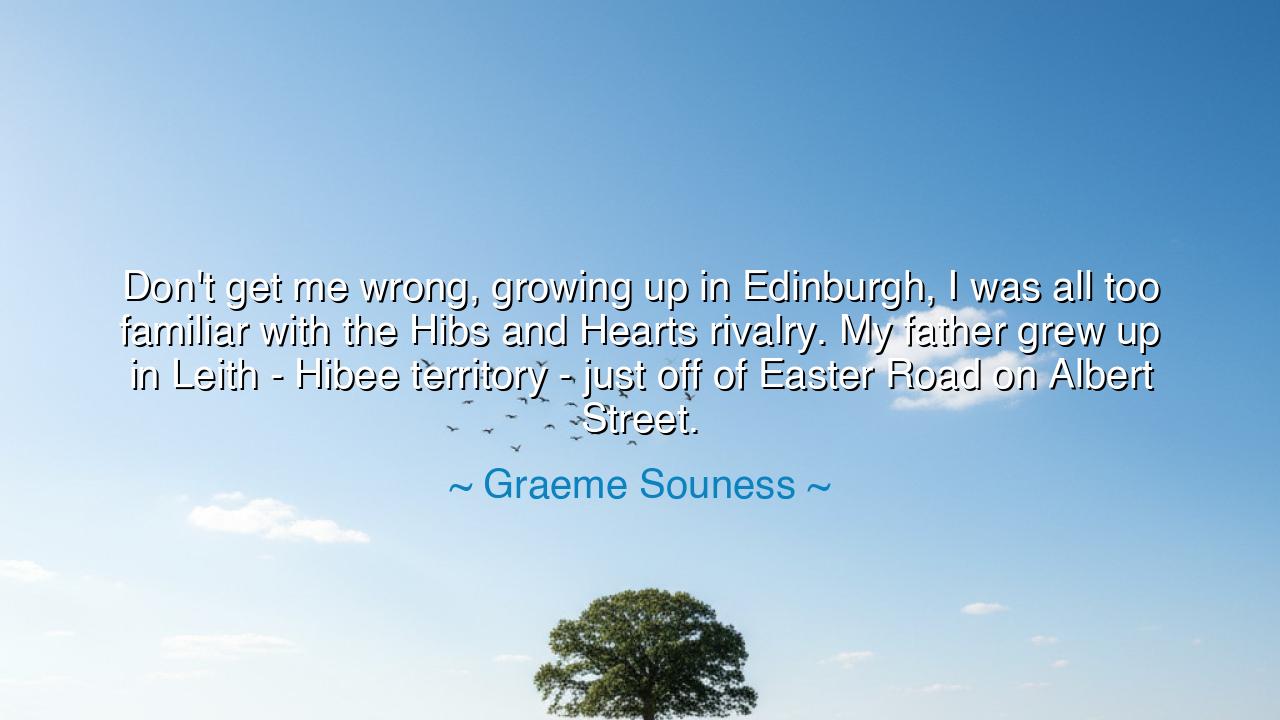
Don't get me wrong, growing up in Edinburgh, I was all too
Don't get me wrong, growing up in Edinburgh, I was all too familiar with the Hibs and Hearts rivalry. My father grew up in Leith - Hibee territory - just off of Easter Road on Albert Street.






When Graeme Souness said, “Don't get me wrong, growing up in Edinburgh, I was all too familiar with the Hibs and Hearts rivalry. My father grew up in Leith — Hibee territory — just off of Easter Road on Albert Street,” he spoke not only of football, but of heritage, loyalty, and belonging. Beneath these simple words lies the deep pulse of identity that binds generations — the unspoken language of home, where sport, family, and pride intertwine to shape the spirit of a people. What he describes is not merely a rivalry between two clubs, but the heartbeat of a city, where color, creed, and passion merge into something timeless: the love of one’s roots.
The Hibs and Hearts rivalry is one of the oldest and fiercest in Scottish football. It is not simply a contest of goals and glory, but a reflection of history itself — of class, culture, and community. Hibernian, born in the heart of Leith, was founded by Irish immigrants seeking unity and recognition through sport. Hearts, representing Edinburgh’s western districts, carried their own legacy of pride and local strength. For decades, these two banners of identity have stood like opposing clans within the same land, each embodying the dreams and sorrows of their people. To grow up amid that tension, as Souness did, was to breathe rivalry like air — to feel its rhythm in the cobbled streets and the echo of every Saturday cheer.
Souness’s mention of his father anchors this rivalry not in hatred, but in heritage. His father, a man of Leith, carried the traditions of the Hibees, their songs and hopes passed down like sacred heirlooms. This was more than fandom; it was belonging — the sense of identity that comes not from one’s own choosing, but from the soil in which one is planted. To know the rivalry was to know the story of one’s people, to feel part of something larger than oneself. Souness’s words, spoken with affection and understanding, reveal the nobler side of rivalry — not division, but the continuity of culture.
In the ancient world, such rivalries existed not only in sport, but in the very fabric of city-states. The Greeks of Athens and Sparta clashed endlessly, yet through that contest they forged excellence. Each sought greatness through opposition, believing that competition sharpened virtue. So too in Edinburgh — through the strife of Hibs and Hearts, the people found pride, purpose, and unity in difference. Rivalry, when tempered by respect, becomes not enmity, but energy — the fire that keeps tradition alive.
Yet Souness, a man who would go on to lead and compete across nations, also understood the wisdom of perspective. To say, “Don’t get me wrong,” is to acknowledge that one can love the rivalry without being consumed by it. It is the voice of one who has seen beyond the boundaries of his youth, yet never forgotten them. He honors his father’s Leith roots — the narrow streets and fervent fans — even as he himself rose to global renown. In that balance lies the mark of maturity: the ability to cherish one’s origins without being confined by them.
The quote, in its heart, speaks of identity and inheritance — how where we come from shapes us, and how remembering it keeps us grounded. Every person, like Souness, carries within them the voice of their ancestors — the laughter in the stands, the pride in the neighborhood, the scent of the pitch after rain. To forget these things is to drift rootless; to remember them is to carry home wherever you go. Even the greatest warriors and wanderers of old, from Odysseus to Hadrian, longed for the lands that birthed them. For it is only by knowing where we come from that we can understand who we are.
And so, the lesson is clear: honor your beginnings. Whether born in Leith, in the shadow of great cities, or in quiet towns, remember the stories that shaped you — the rivalries that taught you passion, the parents who taught you pride. Let your roots strengthen you, not limit you; let rivalry refine you, not divide you. As Souness reminds us through his reflection, greatness does not require abandoning one’s origins — it requires carrying them forward with grace. For in every heart that remembers its home, there lives a light that time cannot extinguish — the light of heritage, loyalty, and love.






AAdministratorAdministrator
Welcome, honored guests. Please leave a comment, we will respond soon